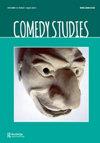Radical improvisation part 1: the liberation of the individual
Q1 Arts and Humanities
引用次数: 1
Abstract
Abstract Improvisation involves a radical dynamic that has the power to liberate the creative imagination of the individual. This is observable in the training systems of the leading improvisation authorities of the Twentieth Century, Viola Spolin and Keith Johnstone, which coalesce around three key principles: engagement with reality in the moment is key to developing spontaneity, that games are a route into this state of engagement, and that discipline imposed by authority is the greatest impediment to this liberation. Following these principles can lead the individual to overcome internalized censorship and therefore liberate the creative imagination of the individual. The effect of this liberation has ripple effects that might impact the improvisor’s community and wider political discourse. Ultimately, the radical potential of improvisation can challenge stable structures of value within societies.激进的即兴创作第一部分:个人的解放
抽象即兴创作包含了一种激进的动力,它具有解放个人创造性想象力的力量。这在二十世纪领先的即兴创作权威维奥拉·斯波林和基思·约翰斯通的训练系统中是可以观察到的,他们围绕着三个关键原则结合在一起:在当下与现实的接触是发展自发性的关键,游戏是进入这种接触状态的途径,权威强加的纪律是这种解放的最大障碍。遵循这些原则可以引导个人克服内化的审查制度,从而解放个人的创造性想象力。这种解放的效果产生了连锁反应,可能会影响即兴创作者的社区和更广泛的政治话语。最终,即兴创作的巨大潜力可以挑战社会中稳定的价值结构。
本文章由计算机程序翻译,如有差异,请以英文原文为准。
求助全文
约1分钟内获得全文
求助全文
来源期刊

Comedy Studies
Arts and Humanities-Literature and Literary Theory
CiteScore
0.60
自引率
0.00%
发文量
26
 求助内容:
求助内容: 应助结果提醒方式:
应助结果提醒方式:


